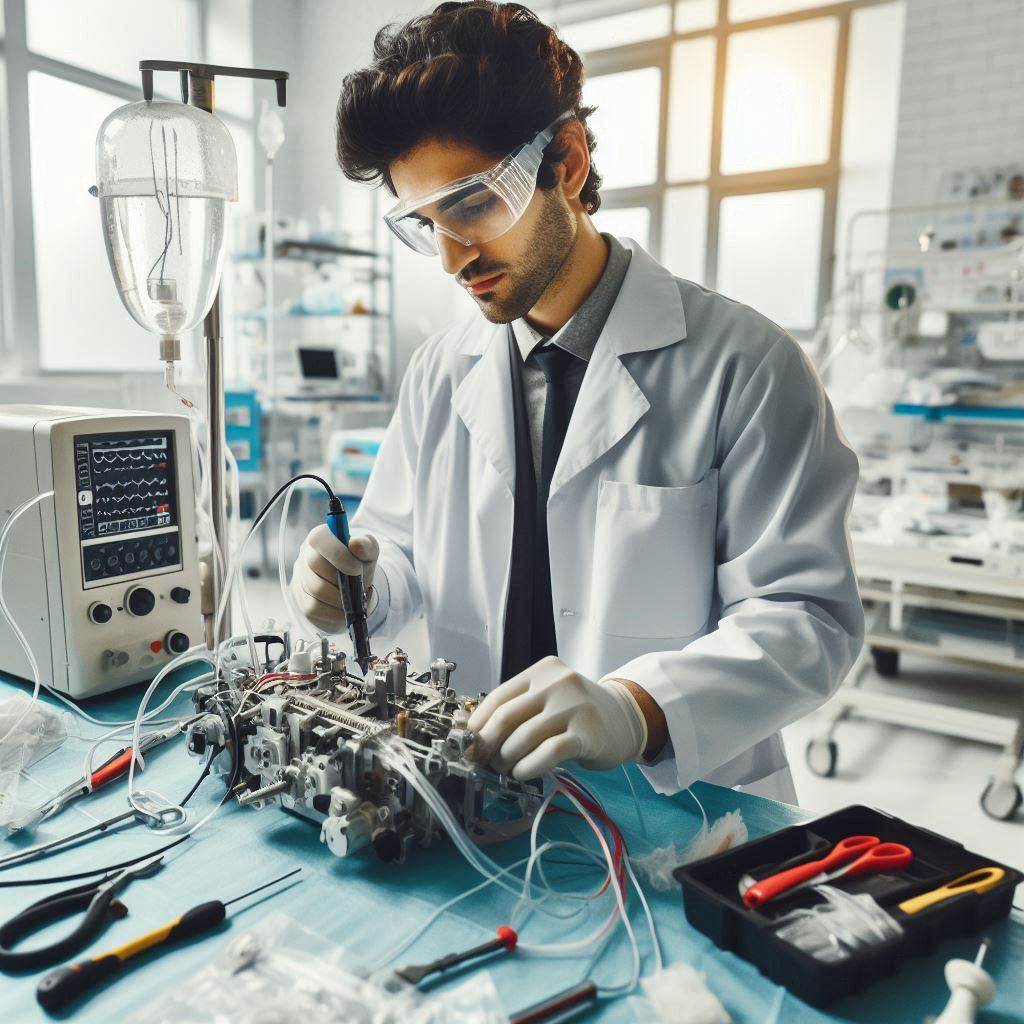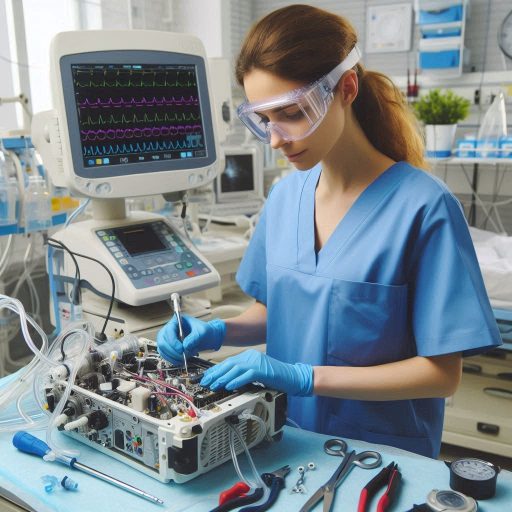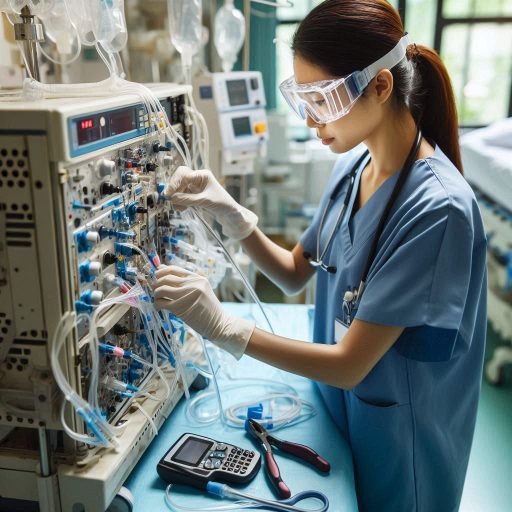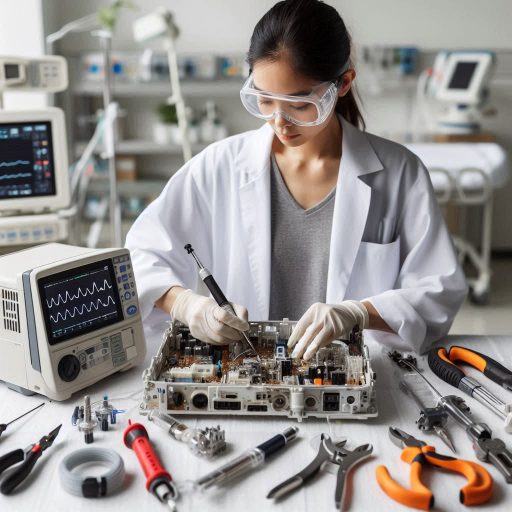Introduction
Biomedical equipment technicians (BMETs) are essential in healthcare settings, ensuring medical devices function optimally for Biomedical Equipment Technicians Educational Pathways
They are responsible for installing, maintaining, and repairing a wide range of medical equipment.
From patient monitors to imaging machines, BMETs keep critical devices in working order, directly impacting patient care and safety.
Their role is vital in preventing equipment malfunctions that could lead to serious medical errors or delays in treatment.
BMETs work closely with medical staff to ensure that the equipment is used correctly and efficiently, thereby enhancing the overall quality of healthcare services.
What Biomedical Equipment Technicians Do
BMETs perform a variety of tasks that ensure the proper functioning of medical devices.
Their day often begins with scheduled maintenance checks, where they inspect and test equipment to prevent potential failures.
These checks include calibrating machines, updating software, and replacing worn-out parts.
When equipment breaks down, BMETs diagnose the problem, perform repairs, and ensure that it meets all safety standards before returning it to service.
In addition to these hands-on tasks, they also document their work, maintain records, and stay updated on new technologies.
BMETs are often called upon to train healthcare staff on the proper use and care of medical devices.
The Importance of Educational Pathways in This Field
Educational pathways are crucial for aspiring BMETs, providing them with the necessary skills and knowledge.
Most BMETs begin with an associate degree in biomedical equipment technology or a related field.
These programs offer coursework in electronics, physiology, and medical device technology, giving students a solid foundation in both technical and medical knowledge.
Some BMETs may choose to pursue certification through organizations like the Association for the Advancement of Medical Instrumentation (AAMI).
Certification not only enhances job prospects but also demonstrates a commitment to the profession.
Continuing education is also important as it allows BMETs to keep up with advancements in medical technology, ensuring they remain competent in their field.
The role of a biomedical equipment technician is integral to the healthcare industry.
By ensuring medical devices are functioning properly, BMETs help prevent errors, improve patient outcomes, and enhance the efficiency of healthcare delivery.
Their work requires a deep understanding of both technology and medicine, making education and ongoing training essential.
Aspiring BMETs should focus on gaining the necessary skills through formal education and certification to succeed in this critical field.
As medical technology continues to evolve, the demand for skilled BMETs will only increase, making this a rewarding and impactful career choice.
Required Education and Training
- Aspiring biomedical equipment technicians need at least an associate degree in biomedical equipment technology.
- A strong foundation in math, science, and electronics is crucial for success in this field.
- Hands-on training is essential for biomedical equipment technicians to gain practical experience.
- Apprenticeships or internships provide valuable real-world experience that complements classroom learning.
Educational Requirements for Becoming a Biomedical Equipment Technician
Biomedical equipment technicians play a critical role in healthcare facilities by ensuring that medical equipment is functioning properly and safely.
To become a biomedical equipment technician, individuals need to meet certain educational requirements.
One of the primary educational requirements for aspiring biomedical equipment technicians is to have at least an associate degree in biomedical equipment technology.
This degree program provides students with the necessary knowledge and skills to work effectively in this field.
In addition to formal education, a strong foundation in math, science, and electronics is essential for success in this profession.
Biomedical equipment technicians need to have a solid understanding of these subjects to effectively troubleshoot and repair medical equipment.
The Importance of Hands-On Training in this Field
While classroom learning is essential, hands-on training is equally important for biomedical equipment technicians.
Hands-on training allows individuals to gain practical experience working with medical equipment, which is crucial for success in this field.
Apprenticeships or internships are common ways for aspiring biomedical equipment technicians to gain hands-on training.
These opportunities provide real-world experience and allow individuals to apply their knowledge in a practical setting.
They also give aspiring technicians the chance to work alongside experienced professionals and learn from their expertise.
Read: Top Surveying and Mapping Technician Employers
Associate’s Degree Programs
The Benefits of Earning an Associate’s Degree in Biomedical Equipment Technology
Earning an associate’s degree in biomedical equipment technology provides a solid foundation for aspiring biomedical equipment technicians (BMETs).
This degree offers a comprehensive curriculum that covers essential topics like electronics, medical terminology, and equipment maintenance.
Students gain hands-on experience through lab work, preparing them for real-world challenges in healthcare settings.
One of the key benefits of an associate’s degree is the balance between theoretical knowledge and practical skills.
Graduates are well-equipped to troubleshoot, repair, and maintain medical equipment.
This expertise is highly valued in hospitals, clinics, and other healthcare facilities, where reliable equipment is critical to patient care.
Another advantage of an associate’s degree is the relatively short time required to complete the program.
Typically, it takes about two years, making it a quicker path to entering the workforce compared to a bachelor’s degree.
This allows students to start their careers sooner, gaining experience and earning a salary while potentially pursuing further education later.
Moreover, an associate’s degree often provides a cost-effective option for education.
Tuition for these programs is generally lower than that of a four-year degree, reducing the financial burden on students.
Additionally, many programs offer flexible schedules, including online and evening classes, allowing students to work while completing their education.
An associate’s degree in biomedical equipment technology also opens doors to various career opportunities.
Graduates can pursue roles such as biomedical equipment technician, medical equipment repairer, and field service technician.
These positions offer competitive salaries and the potential for career advancement in a growing field.
With the healthcare industry’s continued expansion, the demand for skilled BMETs is expected to remain strong, providing job security and opportunities for growth.
Popular Schools and Programs That Offer This Degree
Several reputable institutions across the United States offer associate’s degree programs in biomedical equipment technology.
These programs are designed to provide students with the knowledge and skills needed to succeed in the field.
One of the leading schools offering this degree is the Community College of Philadelphia.
Their Biomedical Equipment Technology program emphasizes hands-on training, preparing students for the demands of the healthcare industry.
Graduates are well-prepared to take certification exams, further enhancing their employability.
Another prominent program is offered by Texas State Technical College (TSTC).
TSTC’s program focuses on the latest technologies and techniques in biomedical equipment maintenance.
Students benefit from small class sizes and personalized instruction, ensuring they receive the support they need to succeed.
For those seeking flexibility, DeVry University offers an online associate’s degree in Biomedical Technology.
This program allows students to complete coursework at their own pace while still receiving a high-quality education.
DeVry’s curriculum includes a blend of theoretical knowledge and practical skills, ensuring graduates are ready to enter the workforce.
These programs provide excellent opportunities for students to gain the education and training needed to become successful biomedical equipment technicians.
With a strong foundation in this field, graduates are well-positioned to pursue rewarding careers in healthcare.
Read: Safety Tips for Field Surveying Technicians
Bachelor’s Degree Programs
Advantages of pursuing a bachelor’s degree in biomedical engineering or a related field
Pursuing a bachelor’s degree in biomedical engineering or a related field offers numerous advantages for aspiring biomedical equipment technicians.
First, this degree provides a comprehensive understanding of the biological and engineering principles essential for the design, maintenance, and repair of medical equipment.
Unlike shorter programs, a bachelor’s degree covers in-depth subjects like biomechanics, medical imaging, and bioinformatics, equipping graduates with a broader knowledge base.
Another advantage of earning a bachelor’s degree is the increased job opportunities it provides.
Employers in the healthcare industry often prefer candidates with a higher level of education because they bring a deeper understanding of complex medical technologies.
This educational background also opens doors to more specialized roles within the field, such as research and development, quality assurance, and medical device design.
Moreover, a bachelor’s degree can significantly enhance career growth and earning potential.
Graduates are more likely to advance into managerial or supervisory positions, overseeing teams of technicians and contributing to the strategic planning of medical technology implementations.
In addition, the extensive training received during a bachelor’s program makes graduates more competitive in the job market, leading to higher starting salaries and better long-term career prospects.
Information on universities that offer relevant programs
Several universities offer bachelor’s degree programs in biomedical engineering and related fields, providing students with the necessary education and training to succeed as biomedical equipment technicians.
For instance, Johns Hopkins University in Baltimore, Maryland, is renowned for its biomedical engineering program, which integrates rigorous coursework with hands-on experience in cutting-edge laboratories.
Students here have access to advanced research opportunities and can collaborate with leading professionals in the healthcare industry.
Another excellent institution is the Georgia Institute of Technology in Atlanta, Georgia.
Its biomedical engineering program emphasizes innovation and entrepreneurship, preparing students to develop new medical devices and technologies.
The curriculum combines engineering fundamentals with practical applications in healthcare, ensuring graduates are well-prepared for the challenges of the industry.
The University of California, San Diego, also offers a highly regarded biomedical engineering program.
Located in a hub of biomedical research and development, UC San Diego provides students with opportunities to engage in internships and research projects with leading healthcare organizations.
The program’s strong focus on real-world applications makes its graduates highly sought after by employers in the medical technology field.
These universities, among others, offer robust programs that equip students with the knowledge, skills, and experience needed to excel as biomedical equipment technicians.
By choosing a bachelor’s degree program at a reputable institution, students can significantly enhance their career prospects and make meaningful contributions to the healthcare industry.
Read: Recent Trends in Surveying and Mapping Technologies

Certification and Licensing
Obtaining certification as a biomedical equipment technician (BMET) is crucial for advancing in this specialized field.
Certifications not only validate your expertise but also demonstrate your commitment to maintaining high standards.
Employers often prioritize candidates who hold certifications, as it assures them of your competency and dedication to continuous learning.
Moreover, certifications can enhance your job security and open doors to more advanced roles.
As technology evolves, certified technicians are better equipped to adapt to new advancements, ensuring they remain valuable assets to their organizations.
Importance of Obtaining Certification as a Biomedical Equipment Technician
Certification is a significant milestone in the career of a biomedical equipment technician.
It serves as a testament to your knowledge, skills, and professionalism in maintaining and repairing medical equipment.
In a field where precision is critical, certification ensures that you are well-versed in the latest industry standards and practices.
Additionally, certification can lead to higher earning potential and greater job satisfaction.
It distinguishes you from uncertified technicians, making you a more attractive candidate to employers who value quality and reliability in their workforce.
Different Certifications Available in This Field
Several certifications are available for biomedical equipment technicians, each catering to different levels of expertise and specializations.
The most recognized certification is the Certified Biomedical Equipment Technician (CBET) credential, offered by the Association for the Advancement of Medical Instrumentation (AAMI).
This certification is ideal for technicians who have a solid foundation in biomedical equipment and are looking to validate their skills.
Another valuable certification is the Certified Radiology Equipment Specialist (CRES) credential, also offered by AAMI.
This certification is tailored for technicians who specialize in radiology equipment, ensuring they have the necessary knowledge to maintain and repair this complex machinery.
For those who focus on laboratory equipment, the Certified Laboratory Equipment Specialist (CLES) certification is available.
This credential demonstrates expertise in the maintenance and repair of laboratory instruments, which are essential in diagnostic and research settings.
Obtaining these certifications typically requires passing an exam, which tests your knowledge and practical skills in the field.
Continuing education is often necessary to maintain these certifications, ensuring that technicians stay updated with technological advancements and industry changes.
By acquiring and maintaining certification, biomedical equipment technicians can enhance their career prospects and contribute more effectively to the healthcare industry.
Read: Networking Tips for Surveying and Mapping Professionals
See Related Content: How to Balance Work and Study in Systems Engineering
Discover More: From Farm to Table: Role of Agricultural Engineers
Internship Opportunities
The Significance of Completing Internships as Part of the Educational Pathway
Internships are crucial for aspiring biomedical equipment technicians.
They bridge the gap between classroom learning and real-world application.
In a fast-evolving field like biomedical equipment technology, hands-on experience is invaluable.
Internships provide students with practical skills that are not easily acquired through textbooks or lectures.
During an internship, students work directly with the technology they will encounter in their careers.
They gain insights into daily operations, troubleshooting, and maintenance tasks.
These experiences also allow students to apply theoretical knowledge to real-world scenarios, solidifying their understanding of complex concepts.
Additionally, internships offer a glimpse into the work environment, helping students understand the demands and expectations of the profession.
This practical exposure is often a deciding factor in a student‘s career readiness and can significantly enhance their employability upon graduation.
Moreover, internships help students build a professional network within the industry.
Networking is vital in any career, and internships provide opportunities to connect with experienced professionals.
These connections can lead to job offers, mentorship, and continued professional development.
Internships also allow students to showcase their skills and work ethic to potential employers, making them more attractive candidates for future employment.
Many employers prefer to hire technicians who have completed internships, as it demonstrates a commitment to the field and a willingness to learn.
How to Secure Internships in Biomedical Equipment Technology
Securing an internship in biomedical equipment technology requires proactive effort and strategic planning.
Students should begin their search early, ideally a few months before they wish to start.
The first step is to research companies, hospitals, and organizations that offer internships in biomedical equipment technology.
Many educational institutions have partnerships with healthcare facilities and companies, so students should consult their school‘s career services or internship coordinators.
These resources often provide listings of available internships and can assist with the application process.
Crafting a strong resume and cover letter is essential when applying for internships.
Students should highlight relevant coursework, skills, and any hands-on experience gained during their studies.
Emphasizing technical skills, such as familiarity with biomedical equipment, electronics, and software, can make a candidate stand out.
Additionally, students should be prepared to discuss their interest in the field and how the internship aligns with their career goals during interviews.
Networking is another effective strategy for securing internships.
Attending industry events, career fairs, and professional organization meetings can help students connect with potential employers.
Joining professional organizations related to biomedical equipment technology can also provide access to internship opportunities and industry contacts.
Lastly, students should be persistent in their search and follow up on applications to demonstrate their enthusiasm and commitment to the field.
Transform Your Career Today
Unlock a personalized career strategy that drives real results. Get tailored advice and a roadmap designed just for you.
Start NowJob Outlook and Salary
Job Prospects for Biomedical Equipment Technicians
Biomedical equipment technicians (BMETs) have a promising job outlook in the healthcare industry.
As healthcare technology advances, the demand for skilled professionals to maintain, repair, and calibrate medical equipment continues to grow.
Hospitals, clinics, and healthcare facilities rely heavily on biomedical equipment, making BMETs essential in ensuring the proper functioning of these devices.
This dependency on technology drives the steady demand for BMETs, offering a stable career path.
According to the U.S. Bureau of Labor Statistics, the employment of medical equipment repairers, including BMETs, is projected to grow 7% from 2022 to 2032.
This growth rate aligns with the average for all occupations, highlighting the consistent need for these professionals.
In addition to hospitals and clinics, BMETs find opportunities in various sectors, including biomedical manufacturing, equipment sales, and government agencies.
With the rise of telemedicine and remote healthcare services, the role of BMETs is expanding further, creating additional job opportunities.
Moreover, the aging population contributes to the increasing use of advanced medical equipment, further boosting the demand for BMETs.
As the healthcare industry evolves, BMETs will continue to play a critical role in maintaining the safety and effectiveness of medical technology, ensuring a positive job outlook.
Average Salary Range for Biomedical Equipment Technicians
The salary for biomedical equipment technicians varies based on factors such as experience, location, and the type of healthcare facility.
On average, BMETs earn a competitive salary that reflects their specialized skills and knowledge.
According to recent data, the median annual wage for medical equipment repairers, including BMETs, is approximately $51,000.
Entry-level BMETs can expect to earn around $37,000 per year, while those with several years of experience and advanced certifications may earn upwards of $75,000 annually.
Geographic location plays a significant role in determining salary, with BMETs in urban areas or regions with a higher cost of living often earning more.
For example, BMETs working in metropolitan areas or major healthcare hubs may receive higher wages due to the increased demand for their expertise.
Additionally, BMETs employed by large hospitals or specialized medical facilities may command higher salaries than those working in smaller clinics or outpatient centers.
Certifications and further education can also positively impact earning potential.
BMETs who obtain certifications such as Certified Biomedical Equipment Technician (CBET) or Certified Radiology Equipment Specialist (CRES) often see an increase in their salary.
Overall, a career as a biomedical equipment technician offers not only job stability but also the opportunity for a lucrative salary, particularly for those who invest in ongoing education and professional development.
Find Out More: Top Industries Hiring Systems Engineers in the US
Conclusion
Aspiring biomedical equipment technicians can pursue various educational pathways to enter this career field.
They can start with a postsecondary certificate or associate degree in biomedical technology or a related field.
These programs provide them with the necessary skills and knowledge to maintain and repair complex medical equipment.
Furthermore, individuals can enhance their career prospects by obtaining a bachelor’s degree in biomedical engineering technology or a similar discipline.
This advanced education equips them with a deeper understanding of the principles behind medical equipment and allows for more opportunities for career advancement.
Overall, acquiring the necessary education and training is crucial for a successful career as a biomedical equipment technician.
It not only opens doors to a rewarding and in-demand profession but also ensures that technicians have the expertise to effectively support healthcare providers in delivering quality patient care.
[E-Books for Sale]
The Big Book of 500 High-Paying Jobs in America: Unlock Your Earning Potential
$19.99 • 500 High-Paying Jobs • 330 pages
Explore 500 high-paying jobs in America and learn how to boost your career, earn more, and achieve success!
See All 500 High-Paying Jobs of this E-Book
1001 Professions Without a Degree: High-Paying American Jobs You Can Start Now
$19.99 • 1001 Professions Without a Degree • 174 pages
Discover 1001 high-paying jobs without a degree! Unlock career tips, skills, and success strategies for just $19.99!




